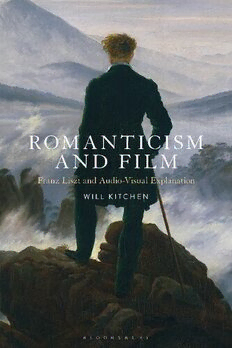Download Romanticism and Film: Franz Liszt and Audio-Visual Explanation PDF Free - Full Version
Download Romanticism and Film: Franz Liszt and Audio-Visual Explanation by Will Kitchen in PDF format completely FREE. No registration required, no payment needed. Get instant access to this valuable resource on PDFdrive.to!
About Romanticism and Film: Franz Liszt and Audio-Visual Explanation
The relationship between Romanticism and film remains one of the most neglected topics in film theory and history, with analysis often focusing on the proto-cinematic significance of Richard Wagner’s music-dramas. One new and interesting way of examining this relationship is by looking beyond Wagner, and developing a concept of audio-visual explanation rooted in Romantic philosophical aesthetics, and employing it in the analysis of film discourse and representation.Using this concept of audio-visual explanation, the cultural image of the Hungarian pianist and composer Franz Liszt, a contemporary of Wagner and another significant practitioner of Romantic audio-visual aesthetics, is examined in reference to specific case studies, including the rarely-explored films Song Without End (1960) and Lisztomania (1975).This multifaceted study of film discourse and representation employs Liszt as a guiding-thread, structuring a general exploration of the concept of Romanticism and its relationship with film more generally. This exploration is supported by new theories of representation based on schematic cognition, the philosophy of explanation, and the recently-developed film theory of Jacques Rancière.Individual chapters address the historical background of audio-visual explanation in Romantic philosophical aesthetics, Liszt’s role in the historical discourses of film and film music, and various filmic representations of Liszt and his compositions. Throughout these investigations, Will Kitchen explores the various ways that films explain, or ‘make sense’ of things, through a ‘Romantic’ aesthetic combination of sound and vision.
Detailed Information
| Author: | Will Kitchen |
|---|---|
| Publication Year: | 2021 |
| ISBN: | 9781501361340 |
| Pages: | 261 |
| Language: | English |
| File Size: | 14.607 |
| Format: | |
| Price: | FREE |
Safe & Secure Download - No registration required
Why Choose PDFdrive for Your Free Romanticism and Film: Franz Liszt and Audio-Visual Explanation Download?
- 100% Free: No hidden fees or subscriptions required for one book every day.
- No Registration: Immediate access is available without creating accounts for one book every day.
- Safe and Secure: Clean downloads without malware or viruses
- Multiple Formats: PDF, MOBI, Mpub,... optimized for all devices
- Educational Resource: Supporting knowledge sharing and learning
Frequently Asked Questions
Is it really free to download Romanticism and Film: Franz Liszt and Audio-Visual Explanation PDF?
Yes, on https://PDFdrive.to you can download Romanticism and Film: Franz Liszt and Audio-Visual Explanation by Will Kitchen completely free. We don't require any payment, subscription, or registration to access this PDF file. For 3 books every day.
How can I read Romanticism and Film: Franz Liszt and Audio-Visual Explanation on my mobile device?
After downloading Romanticism and Film: Franz Liszt and Audio-Visual Explanation PDF, you can open it with any PDF reader app on your phone or tablet. We recommend using Adobe Acrobat Reader, Apple Books, or Google Play Books for the best reading experience.
Is this the full version of Romanticism and Film: Franz Liszt and Audio-Visual Explanation?
Yes, this is the complete PDF version of Romanticism and Film: Franz Liszt and Audio-Visual Explanation by Will Kitchen. You will be able to read the entire content as in the printed version without missing any pages.
Is it legal to download Romanticism and Film: Franz Liszt and Audio-Visual Explanation PDF for free?
https://PDFdrive.to provides links to free educational resources available online. We do not store any files on our servers. Please be aware of copyright laws in your country before downloading.
The materials shared are intended for research, educational, and personal use in accordance with fair use principles.

